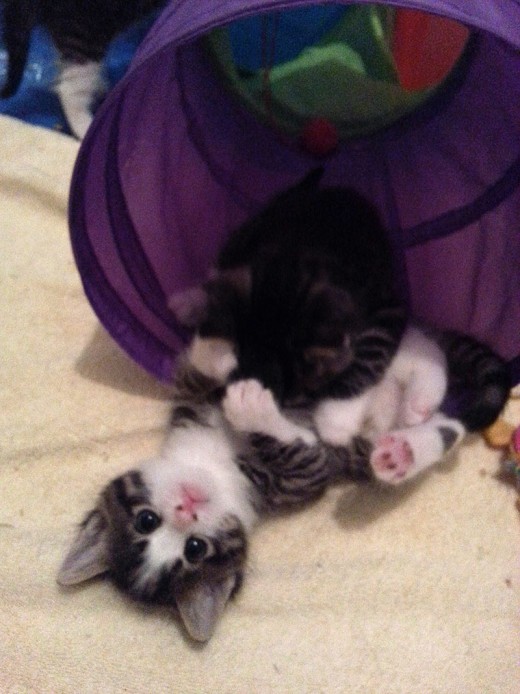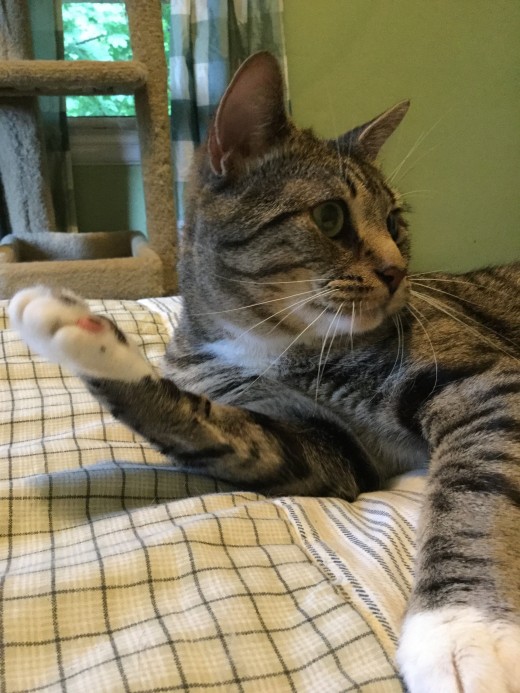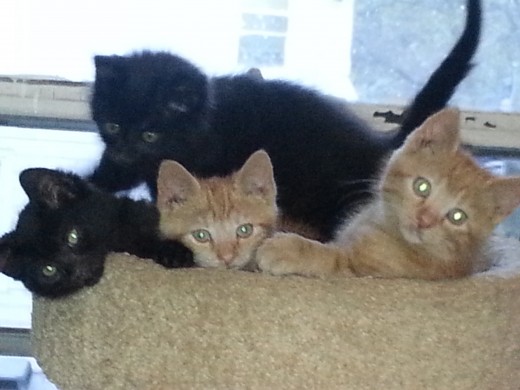Want to Foster a Cat? Ask the Right Questions and Work With the Right Rescue Group
Find and work with a rescue organization that matches your desired level of involvement
Not all animal rescue groups are the same. Not that one is better than another, but rather you suit one better than another. Be honest about your limitations. Form a realistic vision of how you think the process should work. Then match it as closely as you can. Your temporary friend should bring you joy! Don't stumble at the outset.

A cautionary tale (don’t worry, it ends well!)
Be prepared for pitfalls on the way to purrs
Amy (a very capable, young house sitter) texted me Friday evening during my one glorious week at the beach to say that Baby Francis (a bottle feeder) seemed to have been stopped up for nearly 48 hours. You keep track of these things with very young kits since you have to “encourage” them manually to empty their bowels. Two days is a long time for a tiny kit to hold it in and from Amy’s description, Francis was becoming lethargic. I texted another foster mom who quickly checked with our local vet and got an appointment with a tech for first thing in the morning. Amy texted me later to let me know they were both very much relieved, thank you.
Francis eventually grew into a strapping young cat and went home with a very happy family.
So it all turned out well! And yet, so many things went right here that could have gone wrong
I had:
- the option to have my local vet look after Francis quickly rather than having to take him on the longer trip to the shelter for care,
- an emergency fund to pay for the vet bill,
- a relationship with that vet so she knew I was fostering and she responded quickly,
- a community of other volunteers I could call on in a pinch.
I was lucky. I had fallen into this whole thing the right way. Don’t depend on luck! Think ahead a bit.
The best volunteers are those who know their own limits and don't over commit.
The right questions
Unless you are picking a stray cat up off the street and calling that a foster, you will need (and want) to work with a rescue group of some sort. That group will to some extent assign you a cat (or more), support you during your time fostering and help you find your foster animal its forever home.
You need to know how that group envisions the fostering process so you can be sure you are comfortable with what comes with the cat.
As you explore your options (there are probably a few):
- Think about how much you can devote in terms of time, expense and responsibility.
- Decide what kind of cat suits your situation.
- Find experienced foster folk and get some “off the record” accounts. (Most foster parents will be full of stories and glad for the audience!). Pay attention to their stories, not just their enthusiasm. What works for one person may not for another. Their favorite shelter, may be your worst nightmare.
Be the right volunteer for the right organization. We all will differ in what is most important to us and in how much of a commitment we are able to make. The best volunteers are those who know their own limits and don't over commit themselves.
How big is the group? What, if any facilities do they have?
Rescue organizations range in size and complexity from a large operation with multiple buildings with cages and adoption centers to a tiny rescue that operates entirely through foster parents.
In general, larger shelters have a better physical support system for foster parents, however they are sometimes less flexible and more bureaucratic. If you enjoy order and like to work "by the book," a large shelter will offer security. They often can move faster to get your cat adopted or move it to a cage than a smaller group. A smaller rescue may not have a cage at all or be borrowing cages from other groups, but can make of for it through individual attention to you and your cat.
Start thinking about whether you want the surety of a large organization, or prefer a bit more freedom and personal attention.

Do you want to specialize? Will the rescue work with you on that?
Are you interested in a special breed of cat? Do you only care about "community" cats? I know a foster dad who only keeps bottle feeders until weaned and returns them at the "mush face" stage (ever seen a weanling kitten eat?). No, he isn't heartless! If you are home 24/7 for feedings every two hours, but don’t have a safe room for an active, curious kitten, that kind of arrangement can work.
I, on the other hand, work full time, but was blessed for a while to live in a home with three empty bedrooms. I couldn’t take bottle babies, but I could handle multiple litters of crawling, climbing, purring kittens at one time.
There are volunteers who only take senior cats or misfit cats with behavioral issues or shy (potentially feral) cats or special needs cats. Let me offer a few generalizations here (not every situation is the same!):
- Small kittens are more destructive. You need to be a fast and stable on your feet (but they will ALWAYS make you laugh).
- Senior cats are more likely to need expensive vet care (but are so darned appreciative) and are more prone to snuggling and breaking your heart.
- Purebred fosters (or close mixes) will usually find a home faster and be in more demand, but you may need to be more careful about potential adopters.
- Shy or “part feral” cats will take tons of patience and may never adjust. When you do win their trust, you win big.
- Cats with behavioral issues are sometimes destructive, often frustrating, but usually have wonderful personalities. If you like solving puzzles, this is a good, but risky, choice.
- Special needs cats are almost always happier than you are.

Who handles vet care and to what extent? Are there options?
Get a clear idea how vet care will work
Most groups will say that they pay for the bulk of health care or offer low-cost alternatives to your local vet, while other organizations expect that you will take on all or some the expense.
- How ready are you for that and how far can you take it?
- Do you have a relationship with a local vet who understands fostering? Many will work out special pricing for you or through the rescue. Let your vet know what you are up to and get some advice there.
On the flip side, others may insist that all vet care come from their clinicians. If they require you take your charge only to them:
- Make sure that their clinic hours work for you.
- Consider how far you will need to travel for regular vaccinations or for emergencies. When I had multiple litters of kittens, I often found myself spending an entire day each weekend waiting for clinic appointments.
- Find out how available help will be in an emergency. An emergency number no one ever answers or that goes straight to voice mail, is no use at all.
- Consider how you might feel should your baby need help and no one seems to listen.
- Do you trust their vet(s)? Sometimes all a shelter can afford are students from a local university. This might be fine for basic care, but what if something just doesn’t seem right? Do you have options?
I was lucky to find a few organizations who were willing to work with their foster parents. Because of this, Amy took Francis for care a few miles away rather than trying to find her way 35 miles to the shelter. While the shelter took care of vaccines and such, if things were more complex, I’d arrange for an appointment with my own vet and be prepared to pay out of pocket.
One of my old senior boys had a benign growth over one eye. It was benign. The shelter was overwhelmed. They opted to let it be, but I felt he’d get adopted more quickly if I had it removed. It was well worth it, and options are sometimes everything.
How much can you do on your own?
You should also consider how much health care you want to handle on your own.
- To what extent does the organization expect you take care of a sick cat?
- Do they take it back immediately if it is ill? Or do they expect you to be able to give it a pill or other medical care (with training) on your own?
I always preferred to do as much on my own as possible. The thought of leaving my baby (no matter how temporarily mine) behind at the shelter was more than I could bear. The few times I did, I was haunting the staff daily until it was safely back in my fold. And yet, I've seen some first-time foster moms with sick kittens who were just too overwhelmed. Know your limits and options.
Euthanasia?
This is one you need to find before it finds you. Sadly, the world of animal rescue will always depend on trade offs.
Many no-kill shelters, can only remain that way by turning away any animal that can’t be adopted quickly. Others may keep their no-kill name by sending batches of cats to other shelters—some of which may not be no-kill rescues (more about this later when we discuss adoptions).
Some low-kill shelters have greater need of foster parents precisely because they are more willing to take in animals with issues. Smaller rescues often exist specifically to pull at-risk animals from local high-kill shelters. In those cases, you want to be sure you understand the relationship between rescue and shelter.
Think it through:
- Who has the final say over the fate of your furry roommate?
- What if you think your foster can become adoptable, but the rescue thinks otherwise? What are your options?
Get answers in advance. Again, no answer is wrong, but it may be wrong for you.
What about food, litter and all the good (expensive) things?
In most cases you will need to handle food, litter, toys and all the other fun ways to spoil a cat. Sometimes you may get contributions in food and litter, but don't expect much.
So how much can you spend?
When I was growing more than one batch of baby kits at a time, I could easily drop $400/month on litter, formula, high-quality food and toys. Vet bills added more on top of that.
Can you do it more cheaply? Most certainly! Just be realistic. These may not be your forever kits, but you will love them and want to spoil them as though they were.

Most importantly, what is the adoption process? What does that look like and how much are you involved?
When you arrive home with your new temporary best friend, the last thing you want to think about is that day when you say goodbye, but you need to think about it even before you commit.
- What (if any) sort of adoption policy does the organization have in place?
- Are adopters screened?
- Is there an adoption fee?
- Do you have any say in who gets your baby?
- Do you need (or want) to be there to see your charge off to a new home?
- Are you expected to bring your foster for adoption hours on a regular basis or do you simply drop him off and say goodbye forever never knowing the rest of the story?
- Who is ultimately responsible for making sure your foster finds an appropriate home?
What is right for you?
A rescue that needs to hit quotas by shipping fosters out of state for adoption works best with a foster parent who is happy to drop their baby off at the shelter and leave the process to the rescue. However, I've seen cats adopted by foster parents only because they couldn't trust that process.
If possible, I sent all my fosters home in person. Just make sure that you know how it works for the group in question. Don’t ever assume the group you are working with does it the same way as the one your friend worked with.
How your rescue group handles adoptions may prevent you from ending up with “failed” fosters.
It is very difficult to let go of this sweet being you’ve loved for months (sometimes years) if you don’t trust folks to find a good home for it. And you don’t want to get stuck because there are no resources in place to help you find a home. The point of this whole exercise, for better or worse, is to say good bye to one foster so you have room for another (and another and another).
Don't do it alone! Find and work with a community.
Try to find a community of foster parents before you take the leap. I found the right organizations to work with by volunteering at a pet store adoption center. Adoption centers at chain pet stores (such as those ones that begin with “Pet”) have contracts with local animal rescues.
An in-store adoption center can offer a nice, lower-stress option over the drama (euthanasia?) and demands of a shelter environment. Depending on the group and whether the cats stay there while awaiting adoption (or just come in for adoption hours), you could spend just a few hours a month talking up the cats to adopters or cleaning cages. In the meantime, you will discover a dedicated and knowledgeable community.
Thanks to just such a group, I had someone to call to help Amy when Francis needed us, general support whenever things went askew and a crowd of people who understand about the inevitable, always planned, never-really-wanted-but-must-be, bittersweet goodbyes.
Go forth and foster that cat!
It will be so very worth it when you do take the leap and much less scary if you are ready and fully understand the process. Remember:
- You aren’t always in control when you feel you want to be. Know your limits for this and choose wisely.
- Seek the right level of involvement.
- Be prepared for expenses.
- Know how and when you will say good bye
- Don’t do it alone if you don’t have to.
- Grab the joy while you can because there will be tons of that to be had!!
Me? I had one failed foster in all those ten years. My little gray Muffy cat with seizures and no knees. She’s happy, feisty and doesn’t care a bit that she’s different. And every so often I open an email or a text to find a picture of some wonderful foster cat who I almost, but never quite, forgot I once loved.

© 2019 Hat Whit








